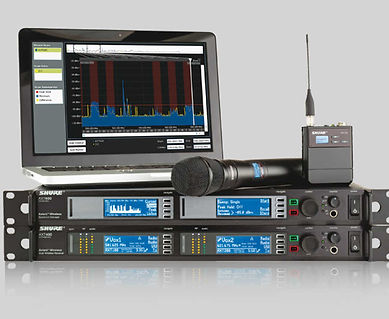Flannel Audio LLC
Comfortable Sound for Everyone
Serving Boston Massachusetts and surrounding areas.
These pages are still under construction...
Please pardon some oddities.
Radio Frequency Coordination
Your situation
-
You have multiple wireless microphones, whether they’re handheld microphones or lavaliere (lapel) microphones, and each time they’re used for an event, you hold your collective breath, hoping they work OK – that you won’t get bursts of noise, or that the local cab company dispatcher won’t come through the system. If you think ‘bad juju’ or some form of voodoo is involved then you were misinformed.
-
What I’d do
-
I would list all of the wireless transmitters you’re trying to use, along with the frequencies and the respective power output of each transmitter.
-
I would examine the quality of the equipment, and the locations of the antennas involved.
-
I would research the frequencies in use near your facility by other entities, or perhaps by your own (i.e. other departments on your campus, or other occupants of your building).
-
-
How I’d do it
-
I would refer to the database(s) kept by the Federal Communications Commission regarding licensed users in your area.
-
I would set up on-site to examine what signals are being received, how strong they are, and on which frequencies.
-
-
What I’d need
-
Depending on the issue(s) we’re addressing I’d need time in your space – from a couple of hours to perhaps several visits over the course of a week (to study reception at different times of day, as necessary).
-
Beyond that, just a couple of days to do some research outside of your site and to compile the data and do several sets of calculations regarding interference.
-
Perhaps some time to research new or different equipment – again, depending on the complexity of your particular issues.
-
-
What you’ll get
-
A written report describing my understanding of what factors are negatively affecting your system, along with suggestions on how to improve the system stability – from simple and inexpensive techniques or ideas, to more costly and comprehensive alterations to your system.
-
Lists and charts and maps describing the various possible sources of radio interference.
-
-
What you won’t get
-
I do not provide nor obtain FCC licenses, nor do I communicate with the FCC on your behalf. However I can make suggestions on vendors who can do that work, if we decide that such action is necessary.
-
I cannot provide guarantees that any radio system will remain trouble-free for life. No one can. The radio frequency landscape here in the US (in any given location) can change drastically and quickly. This isn’t meant to scare; it’s a description of the state of affairs regarding the allocation of frequencies, and the ever-more restrictive set of rules by which we (as users of low-power transmitters) are forced to live.
-
